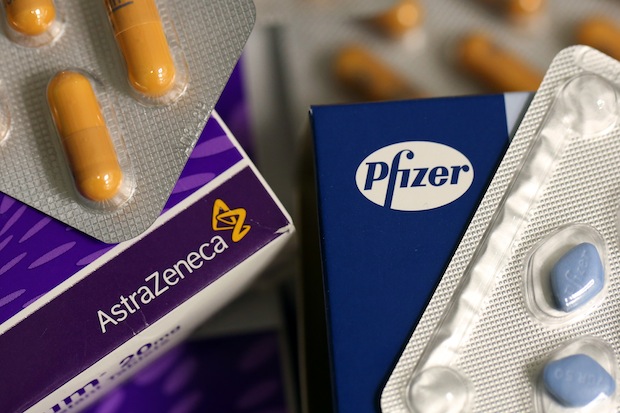Pfizer will almost certainly have to offer more than its second bid of £50 a share for rival drug giant AstraZeneca, but the American predator seems to be winning the game of spin so far. For a start, Pfizer chief Ian Read turns out to be a Scottish-born graduate of Imperial College London who has spent his entire career with the company. AstraZeneca, by contrast, is run by a Frenchman, Pascal Soriot, under a Swedish chairman, Leif Johansson, both parachuted in two years ago — reminders that AstraZeneca is already a multinational with its research facilities divided between Cheshire and Sweden and less than 15 per cent of its workforce based in the UK, and that it has recently recovered from a period of underperformance that provoked the departure of its previous top team.
Ed Miliband’s verbiage about the need for powers to block bids that threaten ‘British jobs and science’ already looks like what it is: opportunism that reveals ignorance and antipathy towards business. Read’s reassurance to David Cameron of ‘long-term commitment to the UK’ may not be worth much as the winds of globalisation blow, but the attractiveness of the UK as a tax base for what could be the world’s largest research-based pharmaceutical group is evidently a cause for celebration for George Osborne. And the doyen of the industry, former GlaxoSmithKline head Sir Richard Sykes, says ‘ownership is irrelevant’ so long as there’s every encouragement for such companies to ‘do their drug discovery and development here’. In short, the game is Pfizer’s for the taking, when the price is right.
Ed’s one-way ticket
Miliband has also been busy ‘looking at options’ for renationalising Britain’s railways at the end of current franchise contracts. This is yet another of what I have called Labour’s ‘targeted tweets’ designed to please trade unions and pick off loose voters — in this case disgruntled south–eastern commuters. What it’s not is a credible, costed policy. Even Ed Balls is said to be distancing himself from such a retrograde idea, while Martin Griffiths, chief executive of the Stagecoach transport group, rightly called it ‘a one-way ticket to higher taxes’ and others in the industry point out that there could be no quicker way to kill existing plans for investment in better trains.
The Miliband case, if we can dignify it thus, is based on the relative success of the East Coast service run by Directly Operated Railways, the ‘arm’s length company’ created by the Department for Transport in 2009 when National Express threw in the towel. As a frequent traveller, I can confirm that East Coast is a marginal improvement on National Express, which was dire but was only there for two years; what’s forgotten is that GNER, the first franchisee on the route from 1996 to 2007, ran a service that set new benchmarks and won real customer loyalty before it was brought down by cash-flow problems in its parent, Sea Containers.
And the irony is that arguably the best of today’s services are already wholly or partly state-owned — just not by our own state. CrossCountry, Grand Central and Chiltern are part of Arriva, owned by German taxpayers through Deutsche Bahn; the Dutch are in East Anglia and the north; the French have 55 per cent of Eurostar.
This is not a rigid ideological issue, because many of the world’s best railways are state-owned. But ours in the British Rail era were among the world’s, or at least Europe’s, worst — ill-managed, under-invested and at the mercy of the unions. Thank goodness Ed Miliband has no real intention of taking them back there.
Selling cheese to China
My reaction may have been a touch too Jeremy Clarkson when United Biscuits, maker of the McVitie’s digestive, was acquired by a Chinese company called Bright Foods in 2010. ‘Thank goodness strongly flavoured cheese is still repulsive to most Asian palates,’ I wrote, otherwise ‘the smiling gentlemen from Shanghai’ might make our cheesemakers their next target, to put something savoury on their biscuits. I was clearly swimming against the tide: environment secretary Owen Paterson, leading a delegation to Shanghai in 2012 and observing surging milk and cheese imports from New Zealand, declared the Chinese market ‘a screaming good opportunity’ for our own dairy producers. And now we learn from the World Bank that the Chinese economy is far bigger in GDP terms than previous estimates, if measured by ‘purchasing power parity’, and that at this year’s expected growth rate of 7.5 per cent it will soon overtake the United States to claim statistical world leadership. Chinese income per capita is still not much more than $10,000 (about a quarter of ours) but that too is growing fast and the whole place is clearly a screaming opportunity for purveyors of all kinds of consumer goods — provided they’re alert to the pitfalls of doing business there.
It’s a long-running theme of this column, but I think I’m right to keep warning about the habitual perils of the China trade. It turns out that the smiling gentlemen recently inspected one of our state-of-the-art cheese factories but found reason to declare it beneath their hygiene standards and slap a temporary ban on all imports of British cheese. A quid pro quo is presumably awaited that will overcome this hitch — perhaps a contract to supply telecoms equipment for Owen Paterson’s office, guaranteed free of listening bugs. But it’s all a bit ripe, you might think, given that 50,000 Chinese babies were hospitalised in 2008 after being given milk products adulterated with the poisonous chemical melamine.
The British creamery concerned has not been named, but I’m hoping it was the one in Gloucestershire that makes Stinking Bishop and that a sample secreted in a visitor’s briefcase — with a view to replicating the product in a laboratory and mass-producing it at a third of the price — had matured naturally on the way home and triggered a chemical weapon detector at Shanghai airport.







Comments